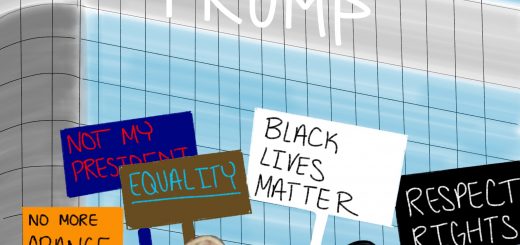Taking a stand by taking a knee
#TakeAKnee. Those three simple words have, rightfully so, taken the country by storm. The attention many professional athletes have gained by kneeling during the national anthem has resulted in a disparity of opinions between people who passionately advocate for the protest and those who vehemently oppose it. The many critics calling for the players to be silenced are missing the point of the protest: anyone who chooses to exercise their first amendment right to peacefully protest by taking a knee during the national anthem is within their right and should not be condemned for doing so.
The movement, which was started by former 49ers quarterback Colin Kaepernick in 2016, wasn’t devised as a way to disrespect the military and veterans, as some–including President Trump–have claimed. Instead, the movement puts to use the freedoms that veterans have fought and risked their lives for.
Every American is guaranteed the same rights, yet when black people try to exercise their right to free speech, they are often vilified for it. Our protests are classified as dangerous, our speeches are branded as spiteful, our opinions are belittled, and our complaints are seen as exaggeratory.
While white supremacists can protest the removal of a confederate statue with tiki torches and be dismissed as simply extreme or attention-seeking, when black people protest the injustice they face on a daily basis, they are often heavily criticized. On top of the ridicule that protesting athletes have faced, a few owners, like Jerry Jones, have declared that they will punish any of their players who choose to “disrespect the flag” by kneeling.This is what systemic oppression looks like. The dominant group benefits from the systematic abuse, exploitation, and injustice directed toward the other.
Kaepernick explained to NFL.com the reasoning behind his action, stating,“I am not going to stand up to show pride in a flag for a country that oppresses Black people and people of color. To me, this is bigger than football and it would be selfish on my part to look the other way. There are bodies in the street and people getting paid leave and getting away with murder.” Those who choose to misconstrue his words have branded him as “un-American” and “unappreciative.” They consider his actions to be unwarranted and disrespectful. But how does calling attention to the injustice and the inequality that a large segment of the population faces equate to being un-American? Standing up for people who can’t stand up for themselves against a system that is mistreating them is America at its best.
People often question why public figures feel the need to use their platforms to push their “political agenda.” They want Sunday Night Football to be about hanging with the boys eating chips and drinking root beer, not worrying about racism. At the end of the day, celebrities are normal people who have been given a tremendous opportunity, and with that opportunity comes the responsibility to use the spotlight given to them to try to effect change. Advocating for people of color and demanding that everyone be treated equally is not pushing a political agenda, but rather fighting for a basic human right.
The NFL players’ protest creates awareness for racial injustice and inequality. The method is not that different from the NFL tradition of players wearing pink in October to raise awareness for breast cancer. That act in of itself won’t fix the problem, but they do it to bring as much national attention to the cause as possible. And, along with their protest, countless players are donating time and money to their communities to try to find a resolution to the issue.
How can I be asked to pledge allegiance to a country that is failing in its promise to provide “liberty and justice for all?” This country needs to do more to achieve racial equality and eradicate racial disparities in the criminal justice system. We need more fairness in the justice system police killings of black men and women. As Kaepernick eloquently articulated, “When there’s significant change and I feel that flag represents what it’s supposed to represent, and this country is representing people the way that it’s supposed to, I’ll stand.”




Recent Comments